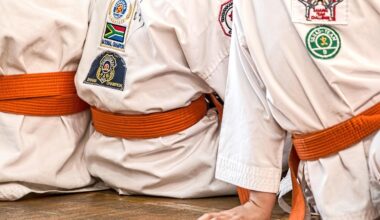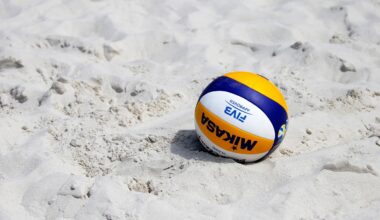Using Nutrition to Prevent Injuries in Calisthenics
Calisthenics is a demanding workout method that uses body weight for resistance. However, serious injuries can sideline even the best athletes. Nutrition plays a pivotal role in preventing injuries and maintaining overall performance. A well-balanced diet rich in nutrients helps support muscle repair and recovery, which is crucial for practitioners engaging in high-intensity workouts. Key nutrients, such as proteins, vitamins, and minerals, facilitate recovery and keep injuries at bay. For instance, protein is essential for muscle repair, while vitamins and minerals support bone health and immune function. Additionally, proper hydration ensures optimal muscle function and helps in the prevention of cramps or strains during workouts. To enhance nutritional intake, consider the quality of your food sources. Whole foods like fruits, vegetables, lean proteins, and healthy fats should be prioritized. Maintaining a diet tailored to your activity level can further help decrease injury risk and enhance performance. Therefore, athletes should analyze their nutritional habits as part of their training program to achieve better results while protecting their body from potential injuries caused by intense physiological demands.
Essential Nutrients for Calisthenics
There are several essential nutrients to consider in your nutrition strategy aimed at injury prevention in calisthenics. First, proteins are fundamental for repairing muscle tissues that endure stress during routines. Healthy sources include chicken, fish, beans, and legumes. Next, carbohydrates serve as the primary energy source necessary for high-intensity workouts. Whole grains, fruits, and vegetables deliver sustained energy and promote quick recovery. Healthy fats should not be ignored, as they play a vital role in joint health and reduce inflammation. Foods rich in Omega-3 fatty acids, like salmon, walnuts, and flaxseeds, are great choices. Furthermore, vitamins, including Vitamin D and C, strengthen bones and enhance the immune system. This is critical for athletes who push their limits frequently. Macro and micronutrients, including calcium and magnesium, also significantly contribute to muscular function and overall performance. Keeping an eye on these nutrients can lead to improved performance and less risk of injury during calisthenics. In addition to a balanced diet, proper timing of nutrient intake can further help to maximize their benefits in relation to calisthenics training.
Fitness enthusiasts engaging in intense calisthenics should also consider the role of hydration in injury prevention. Staying well-hydrated is essential for maintaining optimal performance and reducing the risk of cramps and strains. Water aids in temperature regulation during workouts and lubricates joints to ensure smooth movement. For athletes, it is critical to drink water before, during, and after workouts to replenish lost fluids. Electrolyte-rich drinks may also be beneficial, particularly during extended training sessions when sweat loss can lead to dehydration. Foods like watermelon, cucumbers, and oranges, which have high water content, can add to overall hydration. Alongside hydration, timing and composition of meals play a significant role in supporting muscle recovery. Consuming a post-workout meal that combines protein and carbohydrates helps restore energy levels and facilitates muscle recovery. By actively managing hydration and consciously planning meals around training, athletes can significantly enhance their performance and minimize risks associated with injuries. Overall, a focused approach to hydration and meal timing lays a solid foundation for injury-free training in calisthenics.
Meal Planning for Optimal Recovery
Strategic meal planning is crucial for calisthenics practitioners aiming to prevent injuries right after intense workouts. Prioritize whole foods that provide nutrients necessary for muscle recovery. Create a balanced meal plate by including lean proteins, complex carbohydrates, and healthy fats. Consider snacks rich in these essential nutrients that can be consumed pre- and post-workout. Nut butter on whole-grain toast or Greek yogurt with fruits can offer quick energy and nutrients. A well-planned meal covers not only caloric needs but also micronutrients that support immune function and muscle health. Moreover, consider frequency and portion sizes; smaller, regular meals are easier to digest and help maintain energy levels. Collaborating with a nutritionist or utilizing apps to track food intake can also be advantageous for those new to meal planning. Proper planning helps mitigate the risk of injuries and increases the benefits of training. Additionally, aiming to eat within a specific time frame after exercising can maximize nutrient absorption and stimulate the recovery process. Prioritize planning and avoid relying on processed foods that hinder performance.
Calisthenics practitioners should always strive to listen to their body’s signals regarding treatment and recovery post-injury. Consistent training can lead to fatigue or overuse injuries; therefore, recognizing signs of strain is vital. Resting when necessary speeds recovery and prevents aggravating the injury, which could lead to extended breaks from training. Focus on proper sleep hygiene, as it significantly impacts the body’s ability to heal. Aim for at least seven to eight hours of good-quality sleep each night; this helps to maintain hormonal balance and promotes muscle recovery. Incorporating recovery strategies like foam rolling, stretching, and walking could also support tissue repair and reduce soreness. When planning your nutrition, consider including anti-inflammatory foods in your diet to help mitigate inflammation caused by workouts. Turmeric, ginger, and omega-3-rich foods are great options to complement recovery. A consistent approach to nutrition and a focus on proactive recovery techniques ensures practitioners minimize the risk of injury while maximizing their physical performance. In taking these practical steps, injuries may be reduced effectively, allowing for sustained progress in calisthenics training.
The Role of Supplements
While a balanced diet should cover most nutritional needs, some may benefit from supplements tailored to their specific goals regarding performance and injury prevention. Protein powders, for example, can be a convenient way to increase protein intake, especially post-workout when muscle recovery is a priority; however, one must opt for high-quality sources. Creatine can help increase muscle mass and strength while maintaining hydration status, which may aid in injury prevention. Additionally, certain supplements, such as glucosamine and chondroitin, support joint health and may help those prone to joint-related injuries commonly faced in calisthenics. Always consult a healthcare professional before adding any new supplements to your routine, as individual needs vary. It’s essential to ensure that your supplement choices align with your health goals and physical demands. A poorly chosen supplement can lead to adverse effects, which could hurt performance. Understand that food should always come first, with supplements serving as enhancements for gaps in nutrition when required. In conclusion, effective nutrition and supplementation work hand in hand in preventing injuries in calisthenics.
Lastly, regular evaluations and adjustments of your nutrition plan are crucial for preventing injuries while practicing calisthenics. As training evolves, so do your nutritional needs. Assess your progress periodically to determine if tweaks in your diet are necessary to maintain energy levels, enhance recovery, or prevent injuries. Factors such as increases in workout intensity, changes in body weight, or lifestyle adjustments can necessitate shifts in macronutrient ratios or food choices. Consider creating a food diary that tracks daily nutrient intake, workout intensity, and any signs of fatigue or discomfort. Use this information to inform any future dietary choices. It may also be beneficial to engage with other athletes or experts in the calisthenics community to share advice and successful experiences regarding injury prevention strategies through nutrition. Overall, a proactive and flexible approach to dietary choices ensures that you remain on the path of benefiting from calisthenics training while minimizing injury risks. By nurturing the body through mindful nutrition, athletes will thrive and enjoy a sustainable training experience.


